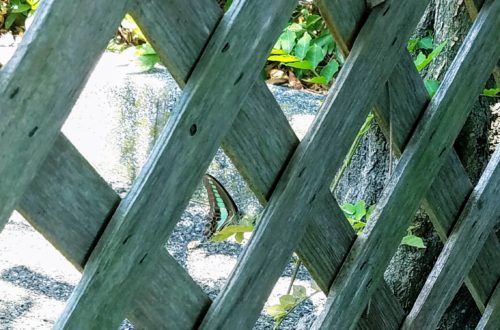
The art of distraction as a parent’s secret weapon
To paraphrase the Hogwarts teacher we all love to hate, the subtle science and exact art of parenting is a good distraction.
My son is on the changing table for his 900th diaper change, and he’s not happy about it. His bottom touches the cushioned pad and, in the beat of a hummingbird’s wings, his expression changes.
One moment, he’s perfectly happy and content, resting on my hip. The next, his eyes screw up and the line of his mouth turns upside-down, and the most pitiful pouty lip emerges. The crying starts and the volume turns all the way up.
Distraction is how we stay sane when they’ve been crying for what feels like three years and I just need to put him down for the two minutes it takes to make a bottle. It’s how we keep them happy during the worst part of the day (at least it is in our house) when it’s time to change clothes.
Distraction is like a magic trick for babies. Keep them watching my right hand, not the left. Keep their attention on the endless entertainment of a comb, not the clean diaper in your hand (certainly not the dirty one at their feet.)
Isn’t that how we live our lives too? Stay focused on the positive. Don’t think about the negative. Push it out of your mind.
If only life were as simple for us as it is for the 8-month-olds. If all it took was a simple distraction to fix our problems, the marriage that’s in trouble, the financial strain on the family because of COVID, the child who’s in trouble at school again, or the back steps that need their nails hammered in for the millionth time.
After the year we’ve all faced, I don’t need to remind anyone we all experience hard things in this life. Some might look and feel different than others, but their weight is equally burdensome on our shoulders.
So much has happened already, and I hope and pray your situation lightens and the burden eases off your back.
But if it doesn’t, take heart, because you are not alone.
I saw a post recently asking to please not hear someone say they needed to lean into this painful season, again. I don’t want to be that person but hear me out.
Whether we lean into or away from a painful season or circumstance doesn’t determine the level of growth we’ll experience on the other side. Nor does it determine the level of healing.
Some things just take time to process and wrap our minds around, more than we might like. Some people are ready to lean in and jump into the depths head-first.
That’s great. Both are great if they’re you or someone you know. We all process our worlds differently, and that’s okay.
There’s no timetable for growth or healing, both emotionally or mentally. But I do know God doesn’t want us living a life wherein we try our absolute best to stay distracted from the thorn in our side.
It does no one any good to distract themselves from the pain of a broken relationship, the loss of a loved one, or the devastation addiction leaves behind in its wake. Distraction from our hurting hearts helps no one move forward or even take the first step toward healing.
It’s a little like hiding your head in the sand on the beach to escape the hurricane raging toward the coastline. The storm is still coming whether you admit you’re scared and face it, or not.
The screaming on the changing table continues. Wanting this to be over as much as he does, I quickly get to work.
I set down his little grey pants with the monkey on the bum near his head and his little body twists like a cat escaping a loving owner’s arms. Before his fingers grasp the fabric, I snatch them up, dangling them above his head, lowering them to touch his face and quickly pulling them back up.
He continues to reach for them, pulling them down to stuff in his mouth, laughing madly and with pure delight. The game is afoot.
Distraction is the handiest tool in my parent arsenal, but I know this little trick won’t work forever. My little boy will grow into a little man (someone make it stop!) and one day we’ll have that hard conversation about rejection at school no parent ever wants their child to go through.
We’ll sit at the kitchen table with a plate of crackers and cheese to nibble. He’ll look up at me worried how I’ll react, if I’ll accept him or reject him like his friend at school.
He’ll tell me all about how a little argument grew and grew until everyone he knows also knows about it, and they’ve taken sides. His precious eyes will fill with tears because he doesn’t understand.
I’ll reach for his hand and assure him he’s always accepted here, and then I’ll explain how this happens to everyone at one point or another. How it’s happened to me. And I’ll tell him there are two directions he can go from here:
1. He can be angry at this friend who hurt him and keep letting the anger win. He can grow resentful and bitter, always keeping his eyes on the past, or
2. He can pray for forgiveness for any wrong he unknowingly committed, for his heart to bend toward forgiving his friend, and for God to use this situation to make him stronger and wiser. He can grow more sensitive to the feelings of others and learn to be the friend he wished he had.



